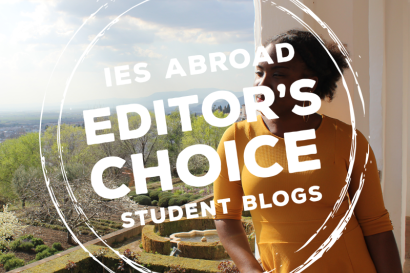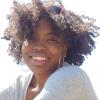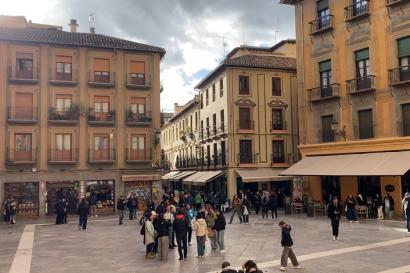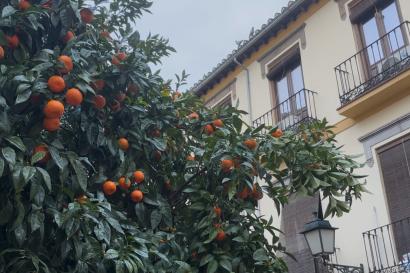So we went hiking (!!! I went hiking in Sierra Nevada. It was wild, guys. It was wild.) and we were given two choices for our time there. I could have either chosen the shorter, easier path, which was more aesthetically pleasing and less physically challenging, or the harder, longer route which was definitely physically challenging alongside it's respective aesthetics. Feel free to guess which one I chose.
Just kidding I'll tell you: I chose the harder route, one that wound uphill and downhill and uphill and downhill and back up again in the very end. On the last stretch, which was simultaneously brutal and blessing to my thighs, I had to remind myself that just because I took a moment to stop and rest didn't mean I wasn't going to push and still make it to the top. Resting did not make me weak but instead gave me the moment I needed to bounce back stronger and keep pushing.
In preparing for my time abroad, one of my best friends constantly told me "Don't worry, Ashley. You just have to get there. You'll be fine." He was right.
My favorite part of Spain so far, besides the aesthetics of the city, has to be the saying: "No pasa nada", meaning: Don't stress, don't worry. Everything will be alright."
To me, walking through Granada feels much like returning to a long lost lover. Someone I'd known before in some other life but have no idea how. I've found myself adapting to this lifestyle easier than I'd anticipated and contribute that in part to my mother telling me to retain an open mind and also in part to the peace I'd felt before traveling abroad. I've never been to Granada, never even been to Europe, but I'm glad I chose this city over Barcelona or Madrid because somehow Granada seems to know me and I've been able to navigate pretty easily.
Yet, my first night here, which I thought would be wrought with me battling my jet lag, instead turned into me battling grief. I received news via text message that my aunt, whom I'd just spoken to only a few days prior, had passed away.
I lay in my new bed in this new place and it felt as if a boulder was laying on my chest slowly crushing my ribcage. It didn't feel like the room was made of oxygen but instead carbon dioxide, only wanting to weigh me down. I cried and shook for five hours, restless, overthinking, suddenly exhausted and cold. Yet, throughout all of my thoughts the all encompassing ones were those of my aunt's last words to me: "You're going to be alright; just remember to pray and put God first."
To be honest, I don't typically pray, but that night I did. However, I've always been a believer that after prayer one cannot simply wait for everything to just come together on its own, but must act in some kind of way. My post-prayer action told me to, "Call your mom, talk to your friends. You are strong and can get past this. You will be alright."
It also told me that though I had already believed this before, this trip is as much for me and my experience as it is for my family back home. I seek to share my adventures with them and hope that through my happiness they can also find their smiles.
Finding the strength to speak the next day was hard because my throat was sore and my face was so puffy from crying it looked like I had an allergic reaction, yet I fell back on my support system and did as my aunt would have called, "Let go and let God." I've coursed through Granada with her in mind, thinking of how she would enjoy the beauty of the city. Grateful that the last thing we were able to say to one another was, "I love you."
The next step was to tell my host mom and program director about my loss, just to ensure that communication and understanding. They each told me to take my time and explained the support that I had available, i.e. a program counselor for students. I assured them each I would vocalize any of my concerns to my best ability and use what resources were available to me.
We can never anticipate these things, and I'm learning that life will constantly have me on the edge of my own mountains, coursing downhill and uphill and downhill again, and that throughout it all I'll have to will my own balance.
My host mom would ask periodically, "Estas bien?" just to check on me, see where my head was at. The first time I uttered a quick, "Si, si." Hoping to return to whatever task was distracting me at the moment. The second time I found better words: "Si. Estoy fuerte." Meaning: Yes. I am strong.
She smiled at me sweetly and patted my arm, a gesture that told me that kindness and caring had no language barrier or threshold. One that warmed my heart.
For those feeling like the city is too much, too bright, too intimidating and home is all that here is not, I hope you can remember You have people here to support you and people back home too. Similar to hiking up a mountain, resting does not make you weak and instead gives you what you need to bounce back stronger. We're all going through some kind of transition, moving onto and/or exploring some unfamiliar version of ourselves. Don't be afraid to reach out to those around you and ask for help. Don't be afraid to reach deep inside yourself and do the same. No pasa nada.
Throughout all of the chaos there is a cosmos. For every horrible night there is a new day and you are not alone.
Rest In Peace, Aunt Cynthia.
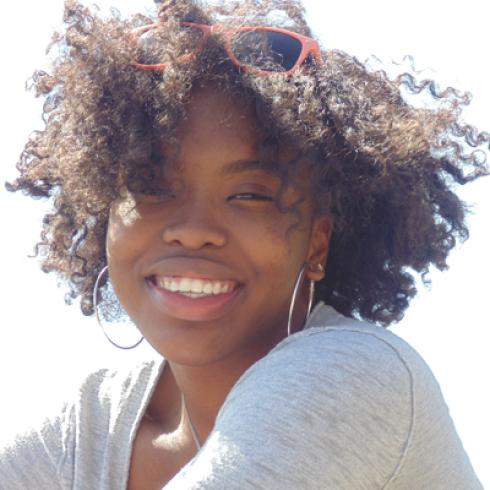
Ashley Simmons
Ashley is the 2015-16 IES Abroad Blogger of the Year! A Junior at Brandeis University, Ashley studies English, Creative Writing, Film, Television, and Interactive Media, as well as Creativity, The Arts and Social Transformation. On campus Ashley is an English Undergraduate Departmental Representative. Originally from Washington D.C., she enjoys cooking, reading, playing the piano, playing video games, and being with her family and friends.

